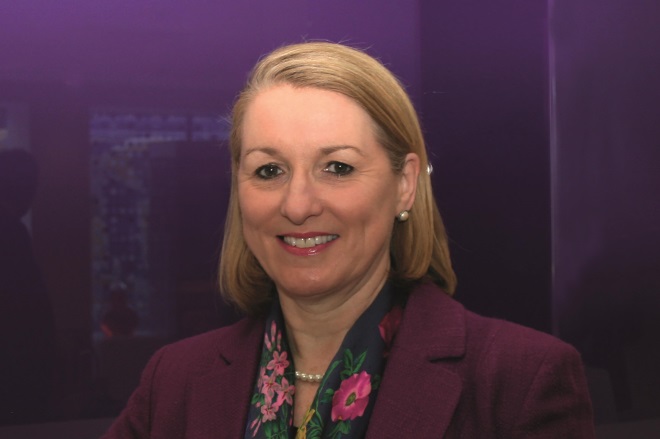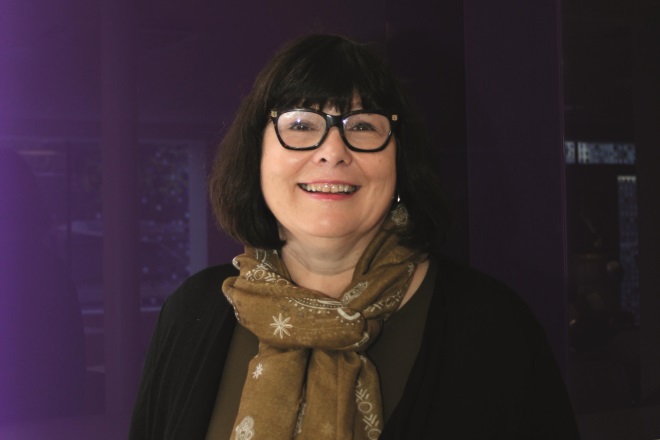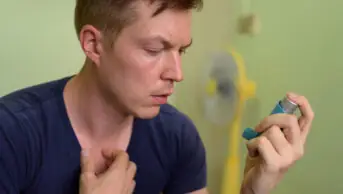
MAG / The Pharmaceutical Journal
Conservative
Sibby Buckle, member of the RPS English Pharmacy Board

Source: MAG / The Pharmaceutical Journal
Sibby Buckle: the RPS emphasised the need for pharmacists to be able to populate the patients’ health record
Pharmacy was high on the agenda at the 2016 Conservative Party conference in Birmingham. At the Health and Care Forum Reception on the Sunday evening with Philip Dunne, minister of state at the Department of Health, and Maggie Throup, member of the health select committee, the need for better recognition of pharmacists and deployment of pharmacist’ clinical skills was discussed. The importance of a viable pharmacy network was also highlighted, with reference to the proposed cuts, and that if community pharmacies were to close, the services that could be delivered from community pharmacy would be compromised.
On the second day of the conference, the RPS engaged in many roundtable discussions and health fringe meetings. Along with the other pharmacy bodies, the RPS met with Alistair Burt, immediate past minister of pharmacy, and Oliver Colvile, the government’s pharmacy champion. The RPS emphasised the need for pharmacists to be able to populate the patients’ health record, the commissioning of a national minor ailments scheme and the imperative to decriminalise inadvertent single dispensing errors. Moving from a supply based contract to a contract of patient care, with an obligation to ensure compliance and minimise waste stimulated much interest and discussion.
It is clear from these discussions that engagement with policy makers and other healthcare professionals is vital to facilitate better collaboration and support for community pharmacists as part of the multidisciplinary team. Vital too is robust engagement with David Mowat, the new pharmacy minister, to ensure continuity on these important issues.
The RPS 2020 health fringe included the Local Government Association and NHS Confederation focusing on public health discussing ‘The New NHS: Are efficiency and patients expectations mutually exclusive?’ The importance of involving pharmacists in mental health, preventative health and point of care testing was encouraging. It was agreed that write access for the pharmacist on the patient record and a national minor ailments scheme were necessary to enable the NHS to meet these increasing demands.
Labour
Claire Anderson, vice-chair of the RPS English Pharmacy Board

Source: MAG / The Pharmaceutical Journal
Claire Anderson: GPs and pharmacists should be seen as an access point for supported self-care
So what do I take away from my day at the Labour party conference? The fact that pharmacy is on everyone else’s lips: other health professionals; leaders of major charities; MPs; and local councillors. They are excited about what we can achieve together and how they need experts on medicines and health to work together with them.
My day at the Labour party conference started with a breakfast forum with the shadow health MPs Diane Abbott and Justin Madders, both of whom recognised that if there are cuts in community pharmacy there would be knock on effects on GPs and A&E. Diane Abbot also said we should focus more on prevention.
After wandering around the exhibition and talking to various charities, such as the Alzheimer’s Society, I took part in a lively round table discussion that the Royal College of General Practitioners (RCGP), had organised on multi-morbidities. There was much discussion about the whole healthcare team working together with patients’ families to focus on the patient. There was also talk of how GP funding would need to change to take account of this different way of working. People with the most multi-morbidities are in the most deprived areas, I told them that this is where community pharmacists are often the only health professional. The table agreed that GPs and pharmacists should be seen as an access point for supported self-care and not just as a route into healthcare. Summing up, Nigel Mathers from RCGP, talked about the importance of pharmacy in managing polypharmacy and also in prevention.
The final event of the day was a panel discussion, I took the opportunity to talk about pharmacists’ training and expertise in medicines and the need for pharmacist prescribers. I then focussed on the value of minor ailments schemes and called for a national scheme. Finally I discussed our role in managing people with long term conditions. And yes I did see Jeremy Corbyn too!
Liberal Democrats
Ash Soni, member of the RPS English Pharmacy Board

Source: MAG / The Pharmaceutical Journal
Ash Soni: doing the same things as always and expecting a different result is a sign of insanity
I was surprised to be asked to cover the Liberal Democrat Party Conference but was keen to see who would be there and what the opportunities might be. I was worried that it wouldn’t be a great benefit as the Lib Dems currently have very few MPs and therefore little influence on the political scene.
How wrong I was!
The opportunity was limited for MP interaction although I did manage to grab a little time with John Pugh and Norman Lamb who acted as a tag team for the session by covering half each. However, the real benefit came from meeting the local councillors who attended. Also, on the panel was Richard Kemp who has been a councillor for more than 30 years but has also been, until recently, the local government association lead for Health & Wellbeing. He was extremely positive about pharmacy and saw it part of health provision rather than the illness service that is the focus of most of the NHS.
This was supported by a number of the councillors who sought opinion on how they could utilise pharmacy more locally within their communities rather than being reliant on the national stage. This was a refreshing and optimistic change from the normal view of seeing doctors as the panacea.
There was a recognition that money is tight but under those circumstances doing the same things as always and expecting a different result is a sign of insanity. Pharmacists and pharmacy offer a different opportunity with the ability to see prevention and better use of medicines as a key value rather than a cost.
I was left with a sense of opportunity rather than the usual concerns and rhetoric. Our job is now to see how we can work more closely with these local politicians by enabling local pharmacists to have the skills and information to lead change with local councillors.


